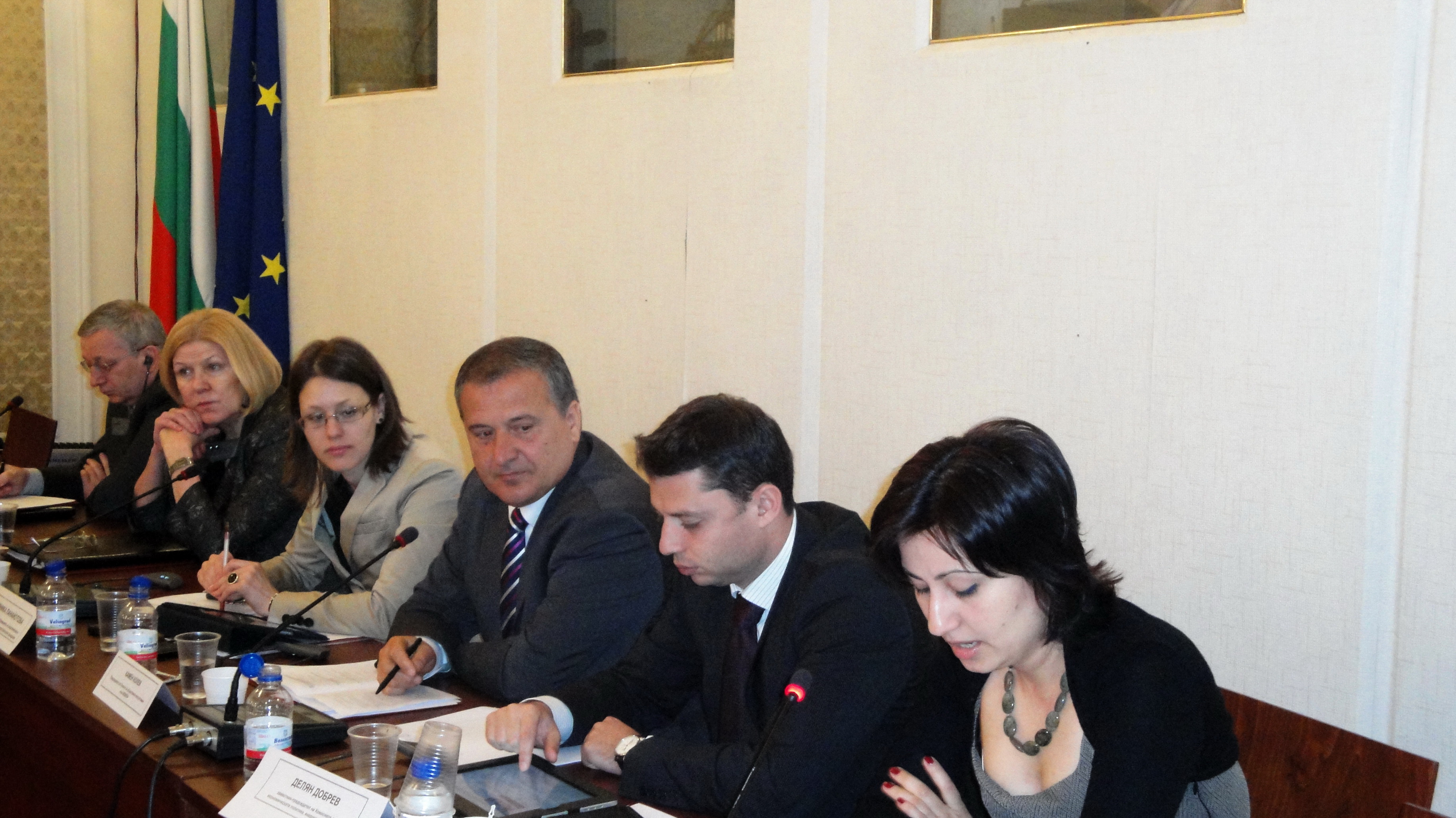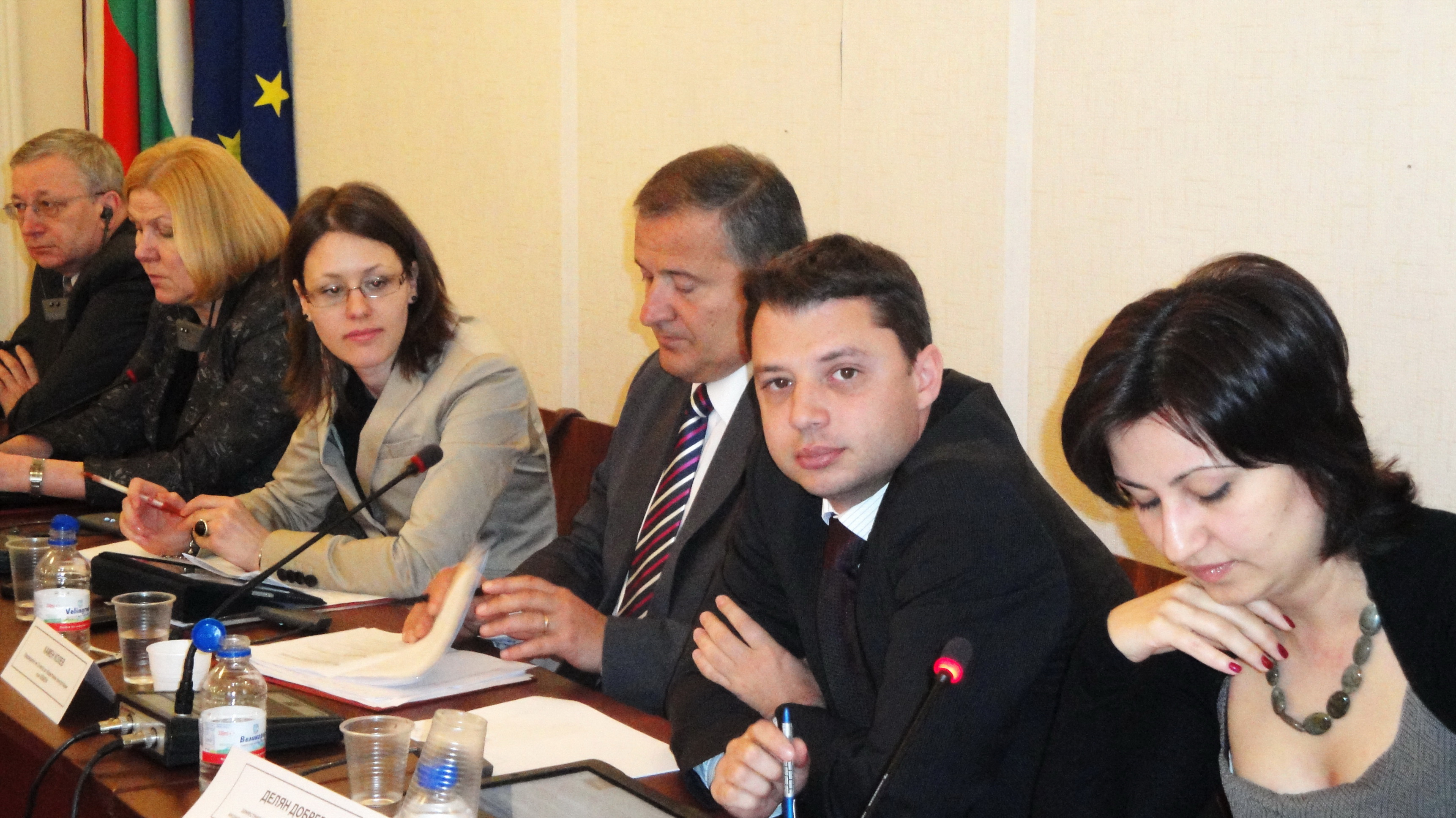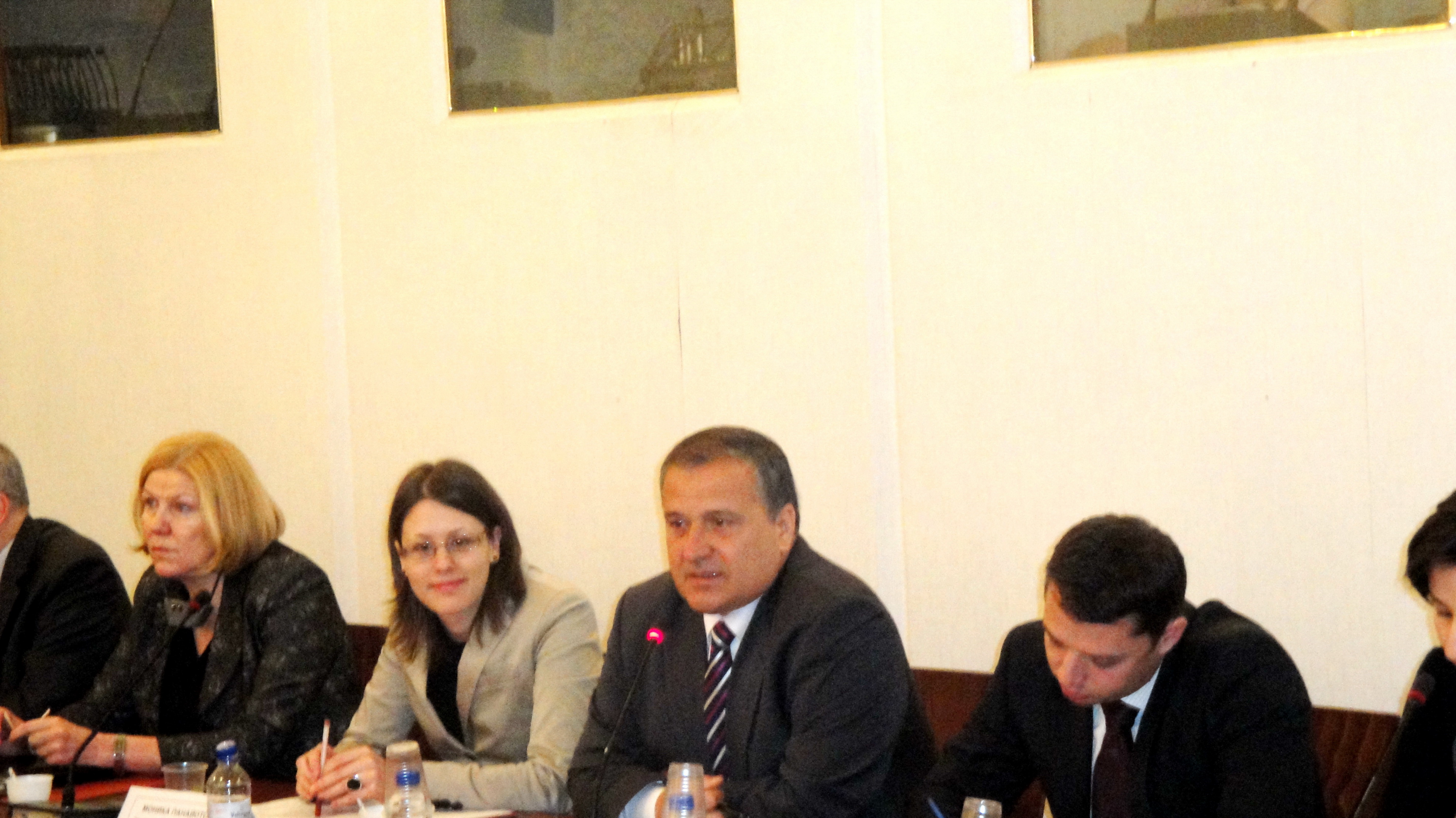National Assembly archive
Fifth Session of the Council for Public Consultations within CEAOEF – From European Semester to the Single Market Act – financial stability and sustainable development of the EU Europe
30/03/2011
At the fifth meeting of the Council for Public Consultations within the Committee on European Affairs and Oversight of the European Funds (CEAOEF), were discussed the current economic policies of the EU. Lectors at the meeting were Ms. Monika Panayotova - Chairwoman of the CEAOEF, Mr. Delyan Dobrev - Deputy Chair of the Economic Policy, Energy and Tourism Committee, Ms. Boriana Pencheva - Deputy Minister of Finance, Ms Iliana Ivanova - Deputy Chairwoman of the Special Committee on the Financial, Economic and Social Crisis (CRIS) of the European Parliament.
At the meeting, besides representatives of NGOs, business and academic community, special guests were the Ambassadors of Poland –H.E. Mr. Leszek Hensel and of Hungary –H.E. Mrs. Judith Lang. They welcomed the participants and pointed out the key challenges to the new economic governance of the European Union until the end of the Hungarian Presidency and the subsequent Polish Presidency in the second half of 2011.
The aim of the meeting was to initiate a discussion in regard to the new economic policy of the European Union from European to national and from macro to micro level. One of the main accents was on the initiative "European Semester” launched in early January 2011 with the Annual Growth Survey. It allows coordination of the economic and fiscal policies of the Member States ensuring mutual response to eventual future crises and enhancing the economic growth in EU. Ms. Monika Panayotova pointed out that “It is necessary to peg the national to the European priorities.” She stressed that the sustainable, intelligent and inclusive growth set in “Europe 2020” strategy should be achieved using all means of the EU economic policies. In that way, the Member States’ sovereignty is not being limited. They are provided with better opportunity to coordinate in advance their National Reform Programmes, Convergence Programmes and draft budgets. What’s more, business can plan its actions at an earlier stage.
Mr Delyan Dobrev, for his part, presented in detail the reasons which have led to economic instability in EU. He stated that with view to the current economic situation, Bulgaria’s major concern is not to allow “Europe on two speeds”. All Member States, in or out of the Euro zone, should demonstrate discipline and responsibility. The obligation of the European countries not to allow public debt more than 60% of GDP, budget deficit over 3% and other macro-economic misbalances is to be set at the highest legislative level.
The lector defended the thesis that the introduction of new uniform economic rules among the European countries would not reflect negatively on Bulgaria’s business and economy. It will improve the business climate and facilitate the development of SMEs in the country. The better functioning of the Single Market will contribute to that process as well.
Highlighting the necessity of civic input to the European economic incentives, he concluded that: "The European Single Market is not a property of the European institutions or some grand pan – European groups: it is the result of every-dat activities – work, saving, buying investing of every European citizen. The construction and use of the Single Market depends solely on us."
Bulgarian priorities in the framework of the new economic governance of the EU were highlighted by Ms. Boryana Pencheva, Deputy Minister of Finance. The Bulgarian incentive called “Financial Stability Pact”will be based on three pillars:
The first one consists of promoting the economic sectors expected to yield the fastest and most certain results. The second one is to guarantee a low budget deficit. The third one refers to protecting the fiscal discipline. Ms. Pencheva also presented the draft of the National Reform Programme. It reflects the recommendations of the Annual Growth Survey. Some of its targets are oriented to enhance research, energy and educational potential of the country and reduce poverty rate. Ms. Pencheva underlined that a significant part of Bulgaria’s economic problems are due to externalities.
Ms. Iliana Ivanova, Deputy Chairwoman of the Special Committee on the Financial, Economic and Social Crisis (CRIS) and a member of the Budget and Finance Committee and the Internal Market and Consumer Protection Committee within the European Parliament, summarized some of the most significant ideas for improving the business practices and legislation of the EU countries in order to achieve a greater level of domestic and international competitiveness. In that context, she highlighted one essential issue in times of economic crises: the protectionism observed in some Member States, contrary to their commitments.
Among the topical issues outlined by the civil society and business representatives were the need for feedback on conducted reforms; stimulation of the innovations; unification of the Patent legislation within the European Union; the future of the Cohesion policy and specifically the Bulgarian perspective; ecology and demographic challenges to the country; the need for better integration of the minorities, etc. During the discussion the Bulgarian Member of the European Parliament shared that Cohesion policy itself could be considered as an anti-crisis measure.
All speakers in the discussion united around the necessity of greater civil activity expressed via concrete reform proposals which are achievable in the context of better cooperation between the institutions and the structures of the civil society and business.
At the meeting, besides representatives of NGOs, business and academic community, special guests were the Ambassadors of Poland –H.E. Mr. Leszek Hensel and of Hungary –H.E. Mrs. Judith Lang. They welcomed the participants and pointed out the key challenges to the new economic governance of the European Union until the end of the Hungarian Presidency and the subsequent Polish Presidency in the second half of 2011.
The aim of the meeting was to initiate a discussion in regard to the new economic policy of the European Union from European to national and from macro to micro level. One of the main accents was on the initiative "European Semester” launched in early January 2011 with the Annual Growth Survey. It allows coordination of the economic and fiscal policies of the Member States ensuring mutual response to eventual future crises and enhancing the economic growth in EU. Ms. Monika Panayotova pointed out that “It is necessary to peg the national to the European priorities.” She stressed that the sustainable, intelligent and inclusive growth set in “Europe 2020” strategy should be achieved using all means of the EU economic policies. In that way, the Member States’ sovereignty is not being limited. They are provided with better opportunity to coordinate in advance their National Reform Programmes, Convergence Programmes and draft budgets. What’s more, business can plan its actions at an earlier stage.
Mr Delyan Dobrev, for his part, presented in detail the reasons which have led to economic instability in EU. He stated that with view to the current economic situation, Bulgaria’s major concern is not to allow “Europe on two speeds”. All Member States, in or out of the Euro zone, should demonstrate discipline and responsibility. The obligation of the European countries not to allow public debt more than 60% of GDP, budget deficit over 3% and other macro-economic misbalances is to be set at the highest legislative level.
The lector defended the thesis that the introduction of new uniform economic rules among the European countries would not reflect negatively on Bulgaria’s business and economy. It will improve the business climate and facilitate the development of SMEs in the country. The better functioning of the Single Market will contribute to that process as well.
Highlighting the necessity of civic input to the European economic incentives, he concluded that: "The European Single Market is not a property of the European institutions or some grand pan – European groups: it is the result of every-dat activities – work, saving, buying investing of every European citizen. The construction and use of the Single Market depends solely on us."
Bulgarian priorities in the framework of the new economic governance of the EU were highlighted by Ms. Boryana Pencheva, Deputy Minister of Finance. The Bulgarian incentive called “Financial Stability Pact”will be based on three pillars:
The first one consists of promoting the economic sectors expected to yield the fastest and most certain results. The second one is to guarantee a low budget deficit. The third one refers to protecting the fiscal discipline. Ms. Pencheva also presented the draft of the National Reform Programme. It reflects the recommendations of the Annual Growth Survey. Some of its targets are oriented to enhance research, energy and educational potential of the country and reduce poverty rate. Ms. Pencheva underlined that a significant part of Bulgaria’s economic problems are due to externalities.
Ms. Iliana Ivanova, Deputy Chairwoman of the Special Committee on the Financial, Economic and Social Crisis (CRIS) and a member of the Budget and Finance Committee and the Internal Market and Consumer Protection Committee within the European Parliament, summarized some of the most significant ideas for improving the business practices and legislation of the EU countries in order to achieve a greater level of domestic and international competitiveness. In that context, she highlighted one essential issue in times of economic crises: the protectionism observed in some Member States, contrary to their commitments.
Among the topical issues outlined by the civil society and business representatives were the need for feedback on conducted reforms; stimulation of the innovations; unification of the Patent legislation within the European Union; the future of the Cohesion policy and specifically the Bulgarian perspective; ecology and demographic challenges to the country; the need for better integration of the minorities, etc. During the discussion the Bulgarian Member of the European Parliament shared that Cohesion policy itself could be considered as an anti-crisis measure.
All speakers in the discussion united around the necessity of greater civil activity expressed via concrete reform proposals which are achievable in the context of better cooperation between the institutions and the structures of the civil society and business.
 Български
Български English
English



